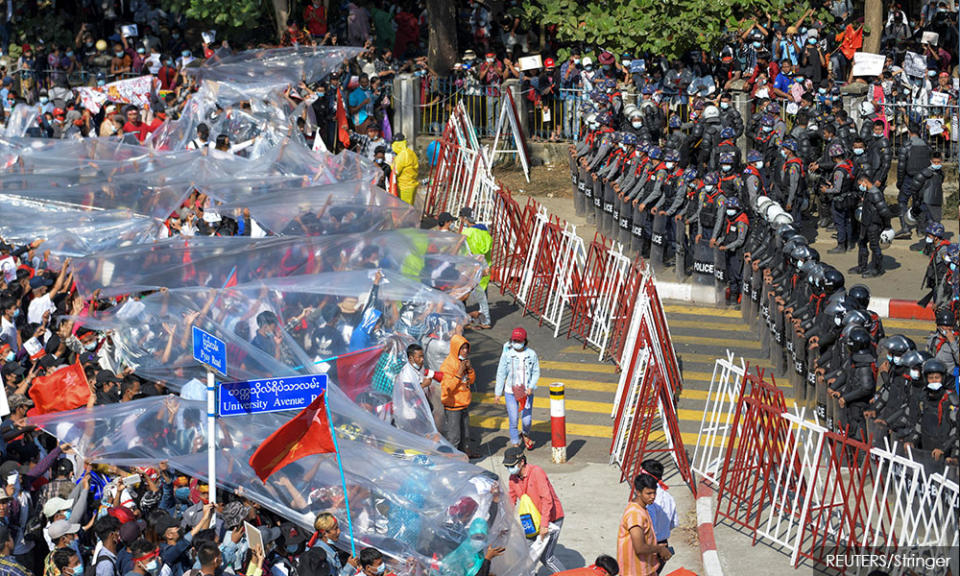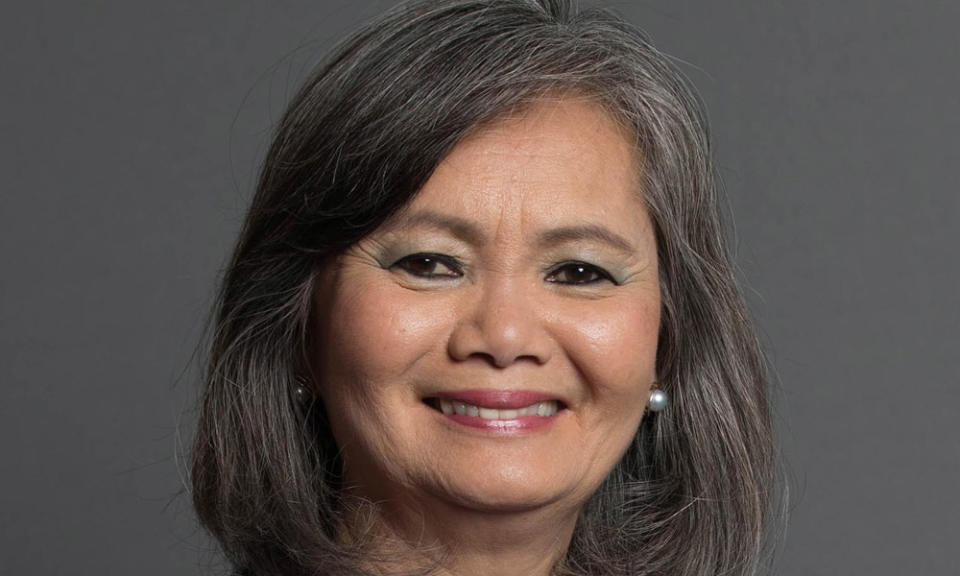‘Companies doing business with Myanmar complicit in murder, atrocities’

The repercussions of the controversial visit by Cambodian prime minister Hun Sen to Myanmar have exposed fault lines in Asean’s response to the brutal military coup in the latter nation.
It is notable that while Myanmar’s democratic reversal following the bloody coup, is one of the most dramatic examples, many Asean nations have experienced democratic backsliding and most of the region’s population live under single-party dictatorships, military governments or compromised democracies.
Former Thai foreign minister Kasit Piromya, speaking in his capacity as part of the Asean Parliamentarians for Human Rights Group (APHR), is among those who believe that targeted economic sanctions are the way forward for Asean.
“There's much more that can be done in the region to push back against the junta in Myanmar, which the people continue to reject every single day, risking their lives to do so.
“Targeted economic sanctions are important. Over the last few decades, the junta has amassed monumental wealth for itself, through legal and illegal means, and these funds are being used to commit crimes against humanity against the population.
“Any company - in Southeast Asia or further afield - that is doing business with the military is complicit in these atrocities, which includes shooting women and children dead, burning people alive, and countless other horrendous acts,” said Kasit who served as foreign minister from 2008 to 2011.

He told Malaysiakini in an email interview that it was imperative that the military's funds are targeted, and that just as countries such as the United States, Canada, and the United Kingdom, as well as the European Union, have placed sanctions against military entities, Asean governments should do the same.
“What's happening in Myanmar is not merely a domestic issue, but a regional one, and we're already seeing the wider ramifications of the crisis play out in Southeast Asia and further afield. Thailand, Laos, China, India and Bangladesh are among those affected by heightened border insecurity brought about by the crisis,” he said.
“Since the coup, the Myanmar people have voiced loud and clear their rejection of the junta and called for them to be removed from power. Southeast Asian governments must recognize that is in their best interests in the short and long term, to help that aim to be achieved,” added Kasit.
Hun Sen visit a flashpoint
The recent visit by Hun Sen was a unilateral move as the first anniversary of the bloody takeover neared. Since the coup, at least 1,300 people have been killed by the junta and more than 10,000 have been arrested while democratically elected leader Aung San Suu Kyi was sentenced earlier this month to four years in jail.

The visit provoked a diplomatic incident when Malaysia’s Foreign Minister Saifuddin Abdullah expressed reservations over Hun Sen's decision to visit Myanmar on Jan 7 while chair of Asean, stating that he should have consulted other Asean members and that it could be perceived as Asean giving recognition to the army generals seizure of power.
The latter labelled Saifuddin arrogant and requested to speak to Malaysian Prime Minister Ismail Sabri Yaakob who expressed Malaysia's support for Cambodia's continued chairing of Asean but also underscored that Putrajaya's position on Myanmar remained unchanged.
Klang MP Charles Santiago, who is also APHR chair said that the visit demonstrated some of the flaws in Asean’s structure, in that Hun Sen, as this year's chair, could unilaterally choose to visit Myanmar and issue a joint statement alongside the coup leader Min Aung Hlaing.
He told Malaysiakini it was a move that risked completely undermining Asean’s limited progress until this point.
“Asean's response to the coup has been highly flawed, but there were some areas of progress, including the Five-Point Consensus, which let's not forget Min agreed to, as well as the decision to ban junta representatives from high-level meetings due to a lack of progress on the Consensus.
“It was encouraging to see leaders of other Member States, including Malaysia and Singapore, remind Hun Sen of the need to stick to the Consensus, and we're pleased to see the premier reverting back to the approach originally agreed to by Asean,” he said.
Charles added that despite its flaws, Asean does have a role to play in resolving the crisis in Myanmar, and he hoped that from now on that Hun Sen will work closely with the other Member States and hold the junta leader accountable towards the Consensus, and work towards ending the junta's violence.
Constant threat of authoritarianism
Mu Sochua, also with the APHR, is one who has witnessed up close, how Hun Sen has preserved his position as Cambodia’s strongman since he first emerged as a national leader in 1979 after the fall of the genocidal Khmer Rouge regime.

Mu is a former women's affairs minister who has opposed Hun Sen as a member of three different parties – Funcinpec, Sam Rainsy Party and the Cambodia National Rescue Party (CNRP) the latter of which was believed to have won the controversial 2013 elections and was subsequently suppressed by Hun Sen.
“It's certainly true that - democracy, press freedom, and judicial harassment - are not in the greatest of health in Southeast Asia at the moment.
“On top of the disastrous situation in Myanmar, there are major concerns about the state of democracy in places like Thailand, Malaysia, and the Philippines, as well as single-party states such as Vietnam, Laos, and now Cambodia.
“In Cambodia, Prime Minister Hun Sen has run roughshod over democracy and all forms of opposition in the last few years.
In 2017, the only viable opposition party, the CNRP, was dissolved by the Supreme Court, which has no semblance of independence from Hun Sen. More than 100 CNRP members were banned from politics for five years, and many were forced into exile, including myself.
“With the opposition removed, Cambodia held a widely discredited election in 2018, which Hun Sen's Cambodian People's Party (CPP) won resoundingly, granting it all seats in parliament. Cambodia today under Hun Sen, who has ruled for more than 30 years, is effectively a one-party state,” said Mu who was at the centre of an international incident in Dec 2019 when there were attempts by the Cambodian government to detain her while she was in exile.
She reminded the world that some 150 CNRP members are facing politically-motivated trials, including Kem Sokha, whose trial re-commenced this month after a two-year delay.
“The government also used the Covid-19 pandemic as an excuse to introduce new laws that further restrict people's rights, and is also in the process of putting in place a new "national internet gateway", sending all internet traffic through a government-run portal, allowing authorities to further monitor and potentially punish online content,” she lamented.
Nonetheless, Mu who served as minister from 1998 to 2004, does not believe that all is lost and that people in the region must take heart from positive developments.
“Yet it's also important that despite this backsliding that we should also recognize the bright spots, which certainly do exist, even if you have to look closely to find them,”
“In the last few years, right across the region, we've seen a new generation of people who are much more politically aware and digitally savvy - who are increasingly willing to push back against the region's autocratic rulers and demand not only their own rights but those for everyone in society.
“Increasingly we've seen discussions around LGBT rights, women's rights, people living with disabilities; all topics that were rarely mentioned in the general discourse in Southeast Asia in the past.
“What's more, these activists from different countries are working closely together, exchanging ideas and lessons learned that can help them in their efforts to push for a fairer and more equal society.
“The courageous individuals who oppose the repression of their fundamental freedoms often do so at great risk and with the odds stacked against them. It is imperative, given the closing space for expression and other freedoms, that like-minded stakeholders principally support these efforts on the ground,” said Mu.
Thai regime still entrenched
Kasit reminded observers that Thailand is still firmly in the grip of a military regime.
“Thailand in the last few years has witnessed a huge pro-democracy movement, with the largely youth-led demonstrations, online and offline, calling for major changes to the country's political order, including the removal of the military from politics, revisions of the Constitution, as well as reforms to the monarchy.
“But rather than listening to these voices, the government has conducted a heavy-handed response, jailing and judicially harassing critics, including opposition MPs, increasing surveillance of the online space, and sometimes resorting to excessive force against peaceful protesters.
“Instead of harassing and attempting to silence them, the Thai government should listen to these young people, who are calling not only for a greater say in their own futures but also for the rights of everyone in Thai society to be respected,” he urged.

Charles said that it was very important for our region's leaders to listen to as diverse a range of voices as possible.
“For too long in Southeast Asia - and of course in other parts of the world - decisions have been made by the so-called elite, while voices from elsewhere, including vulnerable populations, are often ignored. It's often these people who are most directly impacted by the decisions of our leaders, and yet they're very rarely granted a say in these matters.
“The obstacles towards greater democracy in Asean have often been the result of a lack of political will from those at the top, and the systematic repression of opposition voices from being heard or freely and fairly represented in elections.
“Even the more democratic countries in Asean face a critical period where they risk losing even more of the democratic space in the region to authoritarian regimes, which could mean an end to Asean itself as a group,” he warned.
He said that citizens and governments need to ensure that these non-democratic actors do not continue to act with impunity.
“As MPs we have a crucial role to play in this, whether that's by using our public position to advance policies that are progressive, or push back against those that are oppressive, raising issues of concern in national parliaments, or tabling legislation that works towards the advancement of a better society.”

